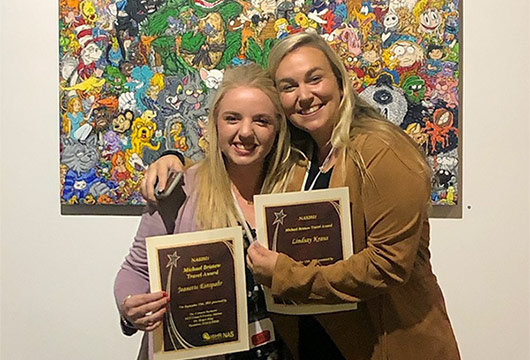Predoctoral students Lindsay Kraus and Jeanette Einspahr happened to sit next to each other at lunch during Temple’s “Interview Day,” when both were candidates for the PhD program in Biomedical Sciences at the Lewis Katz School of Medicine. That chance meeting and their acceptance to the program in 2018 made all the difference.
Lewis Katz School of Medicine. That chance meeting and their acceptance to the program in 2018 made all the difference.
They found themselves in the same classes — sharing with each other the struggles and successes of life in graduate school — and developing a deep friendship. Recently, they celebrated a major triumph that was made all the sweeter because they achieved it at the same time.
Ms. Kraus and Ms. Einspahr submitted separate applications, each based on their individual research, for American Heart Association Fellowships, and both won the competitive awards. Each received a two-year award of about $64,000 to further their cardiovascular research. The award — including a stipend, health insurance, and project support — is expected to carry them through to the end of their graduate programs.
“It’s so great that we got this, but it’s also so great that we got this together,” Ms. Kraus said.
“So often science is about competition,” Ms. Einspahr said. “You’re fighting to get funding or to have the best publication. But with Lindsay and me, it is clear that working together as a team brings the most success. Science is about collaboration, and I’m so grateful to have shared this success with her on our journey as scientists.”
Dianne Soprano, PhD, Associate Dean of Graduate MD/PhD programs at the Katz School, said that collaborative support among students “is something we very much try to foster with each class and across the program.
“These are your colleagues and it’s important to help and support one other because they are your colleagues for life,” she said. The fellowships are very selective nationally, Dr. Soprano said, and are awarded to the most promising students.
Ms. Einspahr is performing research that focuses on an adhesion G-Protein Coupled Receptor, which is located on the surface of cells that enable the heart to contract. Through mouse models and cell-based systems, the research has shown this receptor is important to maintaining cardiac homeostasis and proper contraction of the heart. Her mentor in this research is Douglas Tilley, PhD, Assistant Dean of Faculty Affairs and Associate Professor of Cardiovascular Sciences.
Ms. Kraus is researching the molecular mechanisms behind heart failure. She is focusing on epigenetics, modifications to the human genome that occur outside of normal genetic coding. She is examining what happens when these modifiers are removed and how that affects heart failure. Her mentor in this research is Sadia Mohsin, PhD, Assistant Professor of Pharmacology and Assistant Professor, Cardiovascular Research Center.
Both said that their AHA Fellowship applications were the very first grant proposals they ever submitted. And when they received word in April 2021 telling them they had won, one of the first things they did was share the good news with their mentors.
In August, Ms. Kraus and Ms. Einspahr presented their research at the International Society for Heart Research Conference in Denver, and each won small travel awards.
Ms. Einspahr, a native of Norwood, Pa., graduated from Holy Family University with bachelor’s degrees in biology and chemistry. As a student, she volunteered in the Cardiac Intensive Care Unit at the Hospital of the University of Pennsylvania. After graduation, she worked in virology research at Charles River Laboratories in Malvern. Both experiences, she said, helped steer her toward research in cardiac health.
“Cardiovascular science brings a lot of translational significance for a lot of people,” she said.
Ms. Kraus, a native of Bel Air, Md., graduated from Gettysburg College, where she majored in biology and minored in chemistry. When she began looking into graduate programs, she was unsure of the research specialty she wanted to pursue. The Katz School of Medicine appealed to her because it was close to home and offered a broad array of research choices.
“Temple stood out as being well-rounded and having a lot of options,” she said.
It was during a rotation in a cardiovascular lab that she decided “these are the people I most admire and want to emulate.” Even so, it took her a while to choose a lab that was the right size for her.
“Finding my mentor, Dr. Mohsin, felt like the Goldilocks of situations. It was the perfect size lab in a perfect environment doing really interesting molecular science of the heart,” Ms. Kraus said. “It was a happy middle ground of everything I wanted.”
Dr. Soprano said both Ms. Kraus and Ms. Einspahr were “very strong students. They have a clear goal of where they want to be and they're very committed. They've been great graduate students in their labs and they've been great in supporting other students and activities of the program.”
(The AHA Fellowships are announced in different cycles, Dr. Soprano explained, and in January 2022, a third PhD student, Keman Xu, learned that she, too, had won a two-year fellowship. An article about Ms. Xu’s accomplishment as well as awards won by other graduate students will be featured in an upcoming issue of “Around Katz.”)
“We are incredibly proud of our nationally recognized students,” Dr. Soprano said.
- Lillian Swanson
